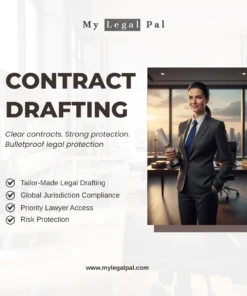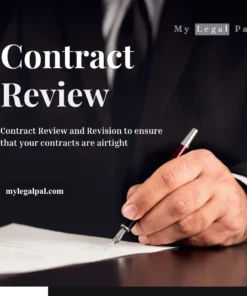What is a Founders’ Agreement?
A Founders’ Agreement is a legal contract between two or more startup founders that defines their rights, responsibilities, equity ownership, and decision-making authority in the company. It’s essentially a prenup for co-founders—meant to prevent misunderstandings, disputes, and breakups from derailing the business later.
The agreement sets clear ground rules on things like how equity is split, who does what, what happens if someone quits, and how major decisions are made.
A Founders’ Agreement is crucial if you’re:
-
Starting a company with one or more partners
-
Contributing unequal resources (money, IP, time, etc.)
-
Building proprietary technology or IP
-
Raising capital or seeking investment
-
Trying to prevent co-founder disputes from turning into lawsuits
It protects everyone involved by establishing a legal baseline of how the company will operate and what happens if things go sideways.
Founders’ Agreement Enforceability?
Founders’ Agreements are legally binding and enforceable like any other contract—provided they’re properly drafted and signed. Local corporate laws and partnership regulations will affect how enforceable certain provisions are. Here’s how it looks in key jurisdictions:
-
United States: Enforceable under state contract law. Useful to combine with bylaws or an LLC operating agreement.
-
European Union: Recognized as a private agreement, but may require alignment with local company formation rules.
-
India: Governed by the Indian Contract Act, 1872. Especially useful for early-stage startups before incorporation.
-
United Arab Emirates: Valid under UAE Civil Code and DIFC contract law. Helpful in free zone startups and offshore company structures.
-
Australia: Covered under Australian common law principles of contract and equity ownership.
-
Singapore: Highly enforceable and recommended before company incorporation. Key to IP and equity protection.
If your founders are based in different countries, make sure the governing law and jurisdiction clause is clearly stated.
What You Need to Create a Valid Founders’ Agreement
To make it legally sound and comprehensive, include the following:
-
Founder Details – Full legal name, address, and ID of each founder
-
Equity Split – Who owns how much and what’s the basis
-
Roles & Responsibilities – Who’s handling tech, ops, legal, sales, etc.
-
IP Ownership – Transfer of any pre-existing IP to the company
-
Vesting Schedule – Protects against a founder leaving early with equity
-
Exit Clauses – What happens if a founder quits, is fired, or dies
-
Decision-Making – How key business decisions will be taken
-
Non-Compete & Confidentiality – Protection against competing ventures
-
Dispute Resolution – How to resolve founder disagreements
FOUNDERS’ AGREEMENT FREE TEMPLATE
Date: _______________
Parties:
- Founder A: _______________ [Name, Address]
- Founder B: _______________ [Name, Address]
- Company: _______________ [Company Name], a Delaware C-Corporation
1. RECITALS
The founders are collaborating to develop _______________ [Business Concept/Project Name] and wish to establish clear terms for their partnership, ownership rights, and obligations as co-founders and shareholders of the Company.
2. DEFINITIONS
- “Shares” means common stock or equity interests issued to Founders
- “Vesting Schedule” means the timeline described in Section 5
- “Good Leaver” means departure due to death, permanent disability, termination without cause, or board-approved resignation
- “Bad Leaver” means voluntary resignation before 24 months or termination for cause
- “Confidential Information” means all non-public business information, including customer lists, financial data, trade secrets, and proprietary methods
- “Intellectual Property” means all patents, trademarks, copyrights, trade secrets, and know-how related to the business
3. INITIAL OWNERSHIP & CONTRIBUTIONS
| Founder | Cash Contribution | In-Kind Contribution | Initial Ownership % |
|---|---|---|---|
| Founder A | $_______ | _______ hours/IP | _____% |
| Founder B | $_______ | _______ hours/IP | _____% |
Important: All shares are subject to the vesting schedule below and may be repurchased by the Company under certain circumstances.
4. VESTING SCHEDULE
4.1 Cliff Period
No shares vest until the first anniversary of this agreement (the “Cliff Date”). If a founder leaves before the Cliff Date, they forfeit all unvested shares.
4.2 Monthly Vesting
After the Cliff Date, 1/48th of each founder’s total shares vest monthly over 4 years total (48 months).
4.3 Acceleration Events
All unvested shares immediately vest upon:
- Change of control where Company valuation exceeds $_______ million, OR
- Termination without cause within 12 months following such change of control
5. INTELLECTUAL PROPERTY ASSIGNMENT
Each founder irrevocably assigns to the Company:
- All existing IP related to the business concept
- All future IP developed during their involvement with the Company
- Worldwide rights in perpetuity
Founders must:
- Execute additional documents to perfect the Company’s title
- Waive moral rights where legally permitted
- Disclose any conflicting IP obligations
6. CONFIDENTIALITY & RESTRICTIVE COVENANTS
6.1 Non-Disclosure
Founders must keep all Confidential Information secret during employment and for 5 years after departure.
6.2 Non-Compete
During involvement and for 24 months after ceasing to be a founder, no founder may:
- Engage in competing business within _______________ [geographic scope]
- Start a competing venture
- Become employed by or consult for a direct competitor
6.3 Non-Solicitation
For 12 months after departure, founders cannot:
- Solicit Company employees to leave
- Recruit Company customers or clients
- Interfere with Company business relationships
7. DEPARTURE OF A FOUNDER
7.1 Good Leaver Scenarios
- Death or permanent disability
- Termination without cause
- Board-approved resignation
- Constructive dismissal
7.2 Bad Leaver Scenarios
- Voluntary resignation before 24 months
- Termination for cause (fraud, gross misconduct, breach of duties)
- Material breach of this agreement
7.3 Share Repurchase Rights
Good Leaver:
- Company may repurchase unvested shares at lower of fair market value or original issue price
- Vested shares remain with departing founder
Bad Leaver:
- Company may repurchase ALL shares (vested and unvested) at original issue price
- 30-day exercise period for Company option
8. GOVERNANCE & DECISION-MAKING
8.1 Board Composition
- Initial board: All founders
- Each founder appoints one director while holding ≥10% of fully-diluted shares
- Board decisions by simple majority unless specified otherwise
8.2 Reserved Matters (Require 66⅔% Shareholder Approval)
- Issuing new shares or equity securities
- Incurring debt >$_______
- Amending articles of incorporation or bylaws
- Selling or licensing core IP
- Hiring/firing C-level executives
- Changing business direction significantly
- Approving budgets >$_______ annually
9. DEADLOCK RESOLUTION
9.1 Trigger
Failure to approve a Reserved Matter after two board meetings held 14+ days apart.
9.2 Escalation Process
- 15-day negotiation between founders
- 15-day mediation with professional mediator
- Texas Shoot-Out (buy-sell mechanism)
9.3 Texas Shoot-Out Process
- Either founder may deliver a Buy-Sell Notice stating a price per share
- Recipient has 30 days to either:
- Sell all their shares at the stated price, OR
- Buy the offering founder’s shares at the same price per share
10. EMPLOYMENT & COMPENSATION
10.1 Founder Salaries
Until the Company raises ≥$_______ in seed financing OR reaches $_______ in ARR:
- Maximum founder salary: $_______ gross annually
- Salary adjustments require unanimous founder approval
10.2 Expense Reimbursement
Pre-approved business expenses reimbursed within 30 days of submission.
10.3 Time Commitment
Each founder commits to work full-time on Company business unless otherwise agreed in writing.
11. TRANSFER RESTRICTIONS
11.1 Lock-Up Period
No founder may transfer shares for 36 months except:
- To the Company under Section 7
- To family trusts (with founder retaining voting control)
- With board approval and 66⅔% shareholder consent
11.2 Right of First Refusal
Company has first right to purchase any shares a founder wishes to sell to third parties.
12. DISPUTE RESOLUTION
12.1 Arbitration
Except for IP or confidentiality breaches (which allow immediate injunctive relief), all disputes resolved through binding arbitration:
- Rules: American Arbitration Association Commercial Rules
- Venue: _______________
- Arbitrator: Single arbitrator, expedited procedure
- Timeline: Decision within 60 days
- Costs: Split equally between parties
13. REPRESENTATIONS & WARRANTIES
Each founder represents that:
- They’re not bound by conflicting agreements
- They own all IP they’re assigning
- Execution doesn’t breach existing obligations
- They have authority to enter this agreement
- All information provided is accurate and complete
14. TERM & SURVIVAL
14.1 Agreement Term
This agreement continues until:
- Company liquidation or IPO, OR
- Replacement by shareholders’ agreement upon first priced equity round
14.2 Surviving Provisions
These sections survive termination:
- Section 5 (IP Assignment)
- Section 6 (Confidentiality & Restrictive Covenants)
- Section 12 (Dispute Resolution)
15. MISCELLANEOUS
15.1 Governing Law
Delaware law governs this agreement (without conflict of law principles).
15.2 Amendments
Modifications require written agreement signed by holders of ≥75% of issued shares.
15.3 Entire Agreement
This supersedes all prior understandings and agreements.
15.4 Severability
If any provision is unenforceable, the remainder remains in full force.
15.5 Electronic Signatures
PDF copies and electronic signatures are acceptable.
SIGNATURES
Founder A: _________________ Date: _______
Print Name: _________________
Founder B: _________________ Date: _______
Print Name: _________________
Company: By: _________________ Date: _______
Print Name: _________________
Title: _________________
SCHEDULES
Schedule A: Detailed IP Assignment
[List specific IP, patents, trademarks, copyrights being assigned]
Schedule B: Existing Obligations
[List any existing employment agreements, non-competes, or IP obligations]
Schedule C: Initial Cap Table
[Detailed breakdown of initial share allocation and any reserved option pool]
This template is for informational purposes only and doesn’t constitute legal advice. Consult with qualified legal counsel before using this agreement.
Need a Custom Agreement?
If your business requires a tailored, legally compliant Founders’ Agreement specific to your industry, My Legal Pal can help. Our experienced legal professionals can draft a comprehensive contract that suits your unique needs and ensures you’re protected every step of the way.


